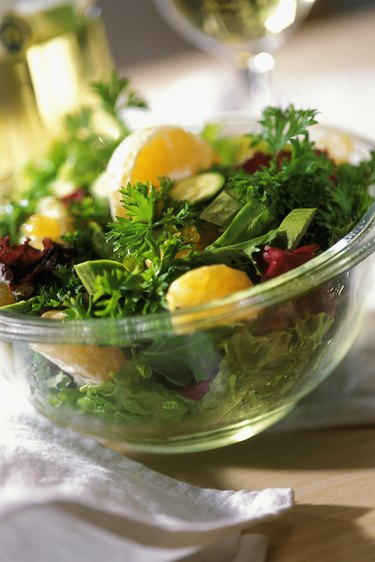
Doctors prescribe lisinopril, an ACE inhibitor, to treat high blood pressure, improve survival rates after a heart attack and treat heart failure. Lisinopril relaxes the muscles in your blood vessels, allowing blood to flow through them more easily. However, taking lisinopril increases your risk of hyperkalemia and hypotension. Dietary restrictions help to decrease these risks and naturally protect your heart from further damage.
Restrictions for Hyperkalemia
Video of the Day
Lisinopril has the potential to cause hyperkalemia, a potentially dangerous increase in the amount of potassium in your blood, especially if you have a history of congestive heart failure or poor kidney function. The use of potassium-sparing diuretics, salt substitutes containing potassium or potassium supplements further increases your risk of developing hyperkalemia while taking lisinopril. The recommended dietary intake of potassium for healthy adults is 4.7 g per day. Consult your doctor to determine the amount of potassium you should consume.
Video of the Day
If you have hyperkalemia, you must limit your consumption of these high-potassium foods: apricots, acorn squash, bananas, bran products, baked beans, cantaloupe, figs, honeydew, broccoli, nuts and seeds, kiwi, peanut butter, mango, cabbage, carrots and citrus fruits.
Restrictions for Hypotension
Hypotension often affects those who are just starting lisinopril treatment. It may also occur if you have decreased blood volume, dehydration and low sodium levels. While doctors often suggest decreasing your sodium intake to prevent hypertension, consuming too little sodium while taking lisinopril may cause your blood pressure to drop too low. Help reduce your risk of developing hypotension by drinking adequate amounts of water and consuming adequate amounts of sodium. Maintaining proper hydration levels requires you to drink more water and limit your intake of beverages containing alcohol. If you become dehydrated, the volume of blood flowing through your veins decreases, causing your blood pressure to drop.
Consult your doctor to determine your ideal sodium consumption. The "2010 Dietary Guidelines for Americans" recommend an upper limit of sodium intake for people with high blood pressure of 1,500 mg per day. Limit your sodium intake by reducing your consumption of high-sodium foods, such as salt, processed foods, salty snacks, fast foods, ham, sauerkraut and canned soups.
Other Dietary Restrictions
Other dietary restrictions help lisinopril control your blood pressure and naturally benefit your heart. Restrict your calorie and fat intake to a level that allows you to maintain a healthy weight. If you have overweight or obesity, gradually reduce your calorie intake and start exercising regularly to lose 1 to 2 pounds each week. Simply reducing your intake of fats quickly reduces your calorie intake and allows you to consume the more nutrient-dense foods your body needs to function optimally. Eliminating processed foods and eating more fiber in the form of fruits, whole grains and vegetables also helps to protect your heart and decrease your calorie intake.
Considerations
Not everyone taking lisinopril needs to limit potassium, sodium, alcohol, calories or fat. Those without any other health conditions, and who currently maintain a healthy weight, often need no dietary restrictions. However, dietary changes that naturally protect your heart may be advised. Consult your doctor about the dietary restrictions you need.
- PubMed Health: Lisinopril
- Drugs.com: Lisinopril Disease Interactions
- National Kidney Foundation: Potassium and Your CKD Diet
- MayoClinic.com; Low Blood Pressure: Treatments and Drugs; Mayo Clinic staff; May 2011
- MayoClinic.com; Heart-Healthy Diet: 8 Steps to Prevent Heart Disease; Mayo Clinic staff; March 2011
Is this an emergency? If you are experiencing serious medical symptoms, please see the National Library of Medicine’s list of signs you need emergency medical attention or call 911.